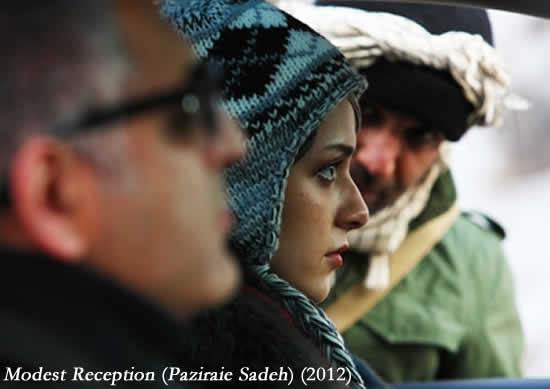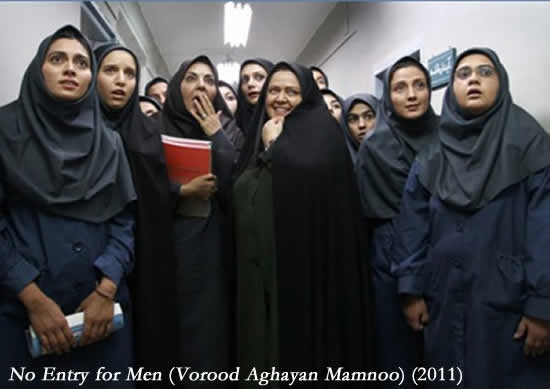 UCLA Film & Television Archive continue its long tradition tracing the unfolding of Iran’s fascinating national cinema. Continually offering compelling new voices and visions, Iranian film responds to a rich storytelling heritage and enters into crucial dialogue with other world cultural and artistic traditions in its unique interplay of social inquiry and formal experimentation. This edition of the UCLA Celebration of Iranian Cinema offers a panoply of genres and storytelling modes, sampling the contributions of an array of film artists, working in widely varying settings and focused on diverse topics.
UCLA Film & Television Archive continue its long tradition tracing the unfolding of Iran’s fascinating national cinema. Continually offering compelling new voices and visions, Iranian film responds to a rich storytelling heritage and enters into crucial dialogue with other world cultural and artistic traditions in its unique interplay of social inquiry and formal experimentation. This edition of the UCLA Celebration of Iranian Cinema offers a panoply of genres and storytelling modes, sampling the contributions of an array of film artists, working in widely varying settings and focused on diverse topics.
2013 Celebration of Iranian Cinema opens April 13 and continues until April 28. We interviewed Shannon Kelley, Head of Public Programs UCLA Film & Television Archive to learn more about the 2013 Celebration of Iranian Cinema.
Bijan Tehrani: Please tell us about the 2013 Celebration of Iranian Cinema
Shannon Kelley: The UCLA Film and Television Archive has been presenting this program for many years. We’ve been especially pleased in the past recent years with the number of new and upcoming talents that bring new voices to the table constantly in a film culture that’s known for its great masters, but also offers exciting and fresh perspectives. We have a mix in this edition of the series. As you can see, we are opening with the first film of the great master Bahram Beyzaie on the 13th of April, with his Downpour from 1972. We also have a terrific first feature by a woman filmmaker Negar Azarbayjani called Facing Mirrors, which is a social drama about people from different walks of life meeting in the contemporary metropolis and the emotional things that happen between them in those chance meetings. It’s a beautiful film and it just won an award this week in Florence, Italy. These are examples of two kinds of films going on in the program. To me it’s very delightful that we are able to juxtapose these different kinds of voices and demonstrate our perspective of the long-term importance of this international cinema to the international film scene.
BT: Are there directors attending the festival?
SK: Yes, it looks as though besides Mr. Beyzaie who will be here for the opening night, we will have as many as four directors in attendance: Ms. Azarbayjani from Facing Mirrors on April 19th, Mr Mohammad Shirvani from Fat Shaker on April 25th, and on April 28th we expect the directors for both films.
BT: Are there films that are made outside of Iran?
SK: That’s a very interesting question. The most noteworthy case is Rhino Season by Bahman Ghobadi, which is an Iranian subject but Mr. Ghobadi doesn’t work in Iran anymore, and this is his most recent feature from 2012. It’s the story of the experience of a Kurdish political prisoner played by Behrouz Vossoughi who gets out of prison after a thirty-year sentence and tries to begin his life again.
BT: How can people attend the screenings?
SK: Students of UCLA can come to any of the Archive screenings free of charge with their valid student ID, and in general students from across the city and seniors enjoy a dollar-off discount from ticket prices. The regular price is $9 at the box office or $10 online – there is an added fee for the service.
BT: Will you have Q&As with the directors?
SK: Yes.
BT: How many films are you showing this year?
SK: We are showing 12 films, including shorts and documentaries. There are 10 screening events, including matinees.
BT: Each film will only have one screening. People will only get one chance to see a film.
SK: Yes, with the exception of Modest Reception, which will be shown two times on Sunday April 14th – a matinee at 4pm and an evening screening at 7pm. Every other film will be shown once only.
BT: Do you think this is a good reflection of Iranian cinema today? How are these films picked from the latest filmmakers? SK: Yes, I do think so. Of course, it’s also true that many times the films that are the most celebrated and best known internationally are not the ones best known in Iran, or perhaps even being shown there. So it’s a very interesting case that almost t all the work is produced in Iran but not in every case shown or very well-known in the country. In a way, it shows the activity of the diaspora as movie goers who support these filmmakers internationally regardless if the films are well-known at home. There’s a very interesting exception in the case of the film No Entry for Men, which is a broad comedy on the subject of the battle of the sexes. The plot line is basically a man who becomes the first male teacher in an all-girl school. It’s a very funny film, it was extremely popular in Iran and now is also available to be seen internationally.
SK: Yes, I do think so. Of course, it’s also true that many times the films that are the most celebrated and best known internationally are not the ones best known in Iran, or perhaps even being shown there. So it’s a very interesting case that almost t all the work is produced in Iran but not in every case shown or very well-known in the country. In a way, it shows the activity of the diaspora as movie goers who support these filmmakers internationally regardless if the films are well-known at home. There’s a very interesting exception in the case of the film No Entry for Men, which is a broad comedy on the subject of the battle of the sexes. The plot line is basically a man who becomes the first male teacher in an all-girl school. It’s a very funny film, it was extremely popular in Iran and now is also available to be seen internationally.
BT: Would you like to add anything?
SK: I hope folks who turn out to see the films will take advantage of a few different things because I do think that they will be very impressed by the breadth of kinds of artistic expressions and points of view that are represented in the series. It’s not all one kind of film, and that’s something that speaks to the great health and imagination of this generation of filmmakers. A film like Fat Shaker is 100% different from a film like No Entry For Men, and they’re both extremely rewarding. This is a chance to see the great artistic spirit that’s going on in Iran right now.
BT: Are there any passes available for the entire series?
SK: Everything is on a single ticket basis for this series.
BT: Who are the sponsors of the event?
SK: The Farhang Foundation is our very generous local sponsor. We received help setting up the travel and arranging the visas of guests through our friends in the US Consulate in Dubai, in terms of making it easier for them to travel.
Please check www.cinema.ucla.edu, for updates on in-person guests.

